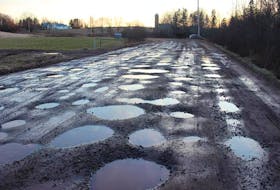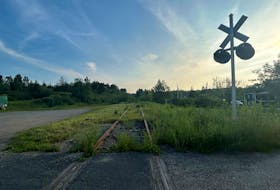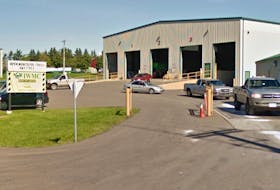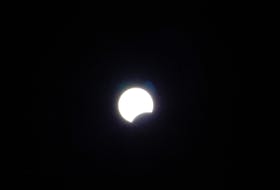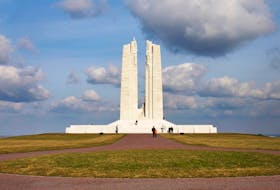. Across our country, we’re seeing the lasting, traumatic impact of Canada’s Indian Residential Schools on generations of aboriginal peoples. The pain continues in places like Lac la Loche, Saskatchewan, Attawapiskat on the James Bay coast and surely here.
So if Nova Scotians are to stand together in committing to a new, equal partnership with aboriginal people in Canada - one based on truth, dignity and mutual respect - the discussions need to open up outside Halifax.
A shared journey of reconciliation might look at changing some of the names weighed down with negative history. In this county, that could be the Cornwallis River. There are definitely those who would prefer to say the Jijuktu'kwejk River (pronounced Gigi-wh`tuk) or Narrow River winds its way through Kings CountyQuietly last December Premier Stephen McNeil asked that a Department of Transportation sign for Cornwallis River be taken down after a request from Mi'kmaq elder Dan Paul. The sign was one all drivers had to pass to reach the Annapolis Valley First Nation.
The statue of founder Edward Cornwallis in Halifax has become most controversial. Dan Paul told the CBC Cornwallis offered a bounty on Mi’kmaq women and children, as well as warriors.
"I think it's hideous in this day and age for a civilized population to be idolizing a man who made an attempt to exterminate a race of people," Paul said.
Back in 2011, the Annapolis Valley First Nation band council passed a resolution calling for the river to go back to its original name. Since then, others have taken up the call.
Last February, a Kentville mother organized some demonstrators to protest the use of the name Cornwallis. Richelle Brown Redden said she was inspired because she couldn’t explain to her young son, Caiden, why the Cornwallis name hasn’t been removed from so many landmarks, given his treatment of native people.
Caiden carried a sign that read, “Wash Cornwallis Away”, while other children carried signs that read, “Compassion not Cornwallis”, “Time for a Change” and “Change Your Heart” while the adults carried signs simply stating, “Rename.”
Brown Redden was at the Wolfville Farmers’ Market recently with information about the drive to rename the river. She says society spends so much time teaching anti-bullying and diversity, it seemed like time to let stop using landmarks to honour Cornwallis.
Next month, Brown Redden and others hope to sit down with Kings County’s municipal leaders and make the case for change. She wants First Nations people to know “we’re listening and we care.”
Dan Paul doesn’t want Cornwallis to be completely erased from the history books.
"He is part of the history of this area, bad or good, he's still part of it,” Paul has said. “He should be acknowledged for that part. But it should also be taught some of the atrocities that he committed."
We would all benefit from learning about what the Mi’kmaw call “two-eyed seeing.” While on our journey on Mother Earth, couldn’t we see from one eye the strengths of indigenous knowledge and from the other eye those of Eurocentric
Knowledge and then use both perspectives to benefit all?
. Across our country, we’re seeing the lasting, traumatic impact of Canada’s Indian Residential Schools on generations of aboriginal peoples. The pain continues in places like Lac la Loche, Saskatchewan, Attawapiskat on the James Bay coast and surely here.
So if Nova Scotians are to stand together in committing to a new, equal partnership with aboriginal people in Canada - one based on truth, dignity and mutual respect - the discussions need to open up outside Halifax.
A shared journey of reconciliation might look at changing some of the names weighed down with negative history. In this county, that could be the Cornwallis River. There are definitely those who would prefer to say the Jijuktu'kwejk River (pronounced Gigi-wh`tuk) or Narrow River winds its way through Kings CountyQuietly last December Premier Stephen McNeil asked that a Department of Transportation sign for Cornwallis River be taken down after a request from Mi'kmaq elder Dan Paul. The sign was one all drivers had to pass to reach the Annapolis Valley First Nation.
The statue of founder Edward Cornwallis in Halifax has become most controversial. Dan Paul told the CBC Cornwallis offered a bounty on Mi’kmaq women and children, as well as warriors.
"I think it's hideous in this day and age for a civilized population to be idolizing a man who made an attempt to exterminate a race of people," Paul said.
Back in 2011, the Annapolis Valley First Nation band council passed a resolution calling for the river to go back to its original name. Since then, others have taken up the call.
Last February, a Kentville mother organized some demonstrators to protest the use of the name Cornwallis. Richelle Brown Redden said she was inspired because she couldn’t explain to her young son, Caiden, why the Cornwallis name hasn’t been removed from so many landmarks, given his treatment of native people.
Caiden carried a sign that read, “Wash Cornwallis Away”, while other children carried signs that read, “Compassion not Cornwallis”, “Time for a Change” and “Change Your Heart” while the adults carried signs simply stating, “Rename.”
Brown Redden was at the Wolfville Farmers’ Market recently with information about the drive to rename the river. She says society spends so much time teaching anti-bullying and diversity, it seemed like time to let stop using landmarks to honour Cornwallis.
Next month, Brown Redden and others hope to sit down with Kings County’s municipal leaders and make the case for change. She wants First Nations people to know “we’re listening and we care.”
Dan Paul doesn’t want Cornwallis to be completely erased from the history books.
"He is part of the history of this area, bad or good, he's still part of it,” Paul has said. “He should be acknowledged for that part. But it should also be taught some of the atrocities that he committed."
We would all benefit from learning about what the Mi’kmaw call “two-eyed seeing.” While on our journey on Mother Earth, couldn’t we see from one eye the strengths of indigenous knowledge and from the other eye those of Eurocentric
Knowledge and then use both perspectives to benefit all?


